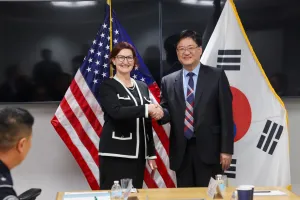-
In our work to facilitate legitimate trade, collaboration is the name of the game. In May, I had the privilege of joining a delegation of government and industry leaders from the Republic of Korea for a ribbon-cutting ceremony to celebrate the deployment of the Electronic Certification System (eCERT). eCERT revolutionizes the way that trade documents are processed and authenticated and is a model for global trade efficiency. Our collaboration with the Republic of Korea demonstrates our shared commitment to creating a trade environment that enhances both security and predictability.
I’d also like to highlight Executive Director (XD), Trade Policy and Programs, Brandon Lord’s recent appearance before the U.S. House of Representatives Committee on the Judiciary Subcommittee on Courts, Intellectual Property, and the Internet. In his testimony, XD Lord stressed CBP's collaborative, new efforts with government and industry partners in the enforcement of intellectual property rights.
You can read more about these and other our other recent activities below.
~ Executive Assistant Commissioner AnnMarie R. Highsmith
-
Contents
- EAC's Message
- I. Office of Trade Activity
- II. Outreach
- III. News You Can Use
- Article 1: Four men indicted attempting to smuggle exotic birds from Puerto Rico to the Dominican Republic
- Article 2: Philadelphia CBP finds 60 illegally imported dead butterflies
- Article 3: CBP officers at the Port of Rochester discover counterfeit NFL, NBA and MLB championship rings
- Article 4: CBP agriculture specialists ensure Mother’s Day flowers are disease and pest free
- Article 5: Philadelphia CBP officers unspool 10,000 'Xanax' pills creatively concealed inside corded cotton
- Article 6: CBP officers disrupt suspected wildlife smuggling attempt at Otay Mesa Port of Entry
- Article 7: Cincinnati CBP seizes cobra, scorpion and spider venom and other illicit horse performance enhancers
- Article 8: Los Angeles CBP works with U.S. Fish and Wildlife Service to seize contraband turtle skulls, baby crocodiles, kangaroo meat and elephant toenails
- Trade Statistics
I. Office of Trade Activity
CBP’s Electronic Certification System improves Republic of Korea steel exports
On May 15, leaders from U.S. Customs and Border Protection (CBP) and the Republic of Korea met in Washington, DC to celebrate the Republic of Korea’s adoption of the Electronic Certification System for steel exports to the United States. This government-to-government system is expected to reduce processing times, enhance security and transparency, and improve quota compliance and enforcement.
This development marks a key partnership between the United States and the Republic of Korea and will improve trade between the two countries. CBP continues to encourage other countries to consider how adopting the eCERT could transform their trade practices.
Read more in the eCERT press release.
CBP increases transparency in proprietary investigations
On May 29, CBP announced a process that will increase access to business confidential information in Enforce and Protect Act (EAPA) administrative proceedings. The process, which involves granting an Administrative Protective Order (APO) to authorized individuals, will enable eligible parties to better answer CBP’s questions and to prepare arguments throughout the course of an investigation. To inform applicants and others interested in the APO process, CBP published a new handbook and factsheet with detailed information.
Read more in the APO press release.
CBP and HSI verify compliance of textile factories in El Salvador
From May 11-25, the joint CBP and Homeland Security Investigations (HSI) Textile Production Verification Team conducted official visits at textile factories in El Salvador. The group reviewed the factories’ production capacity and compliance with the Dominican Republic-Central America free trade agreement, verifying their ability to claim preferential duty treatment on goods being imported into the United States.
The team continues to visit factories around the globe to verify compliance with various free trade agreements, with more than 90 factories visited in Fiscal Year 2024 thus far.
Read more about the U.S. government’s enhanced textile enforcement efforts in the Department of Homeland Security press release.
CBP’s new measures enhance enforcement in small package imports
On May 31, CBP Acting Commissioner Troy Miller announced increased efforts to prevent exploitation within the de minimis environment, which allows duty-free importation of small shipments valued under $800. While most participants comply with the laws, CBP suspended several brokers from the voluntary Entry Type 86 Test for posing compliance risks. The enforcement aims to protect the supply chain from misuse, including the illegal import of materials for synthetic drugs. CBP will consider reinstating suspended brokers who develop effective remedial plans, ensuring continued protection for American consumers and the integrity of the trade system.
To learn more, read Acting Commissioner Miller’s statement.
II. Outreach
XD Brandon Lord testifies before U.S. House of Representatives
On May 7, Brandon Lord, Executive Director, Trade Policy and Programs, testified before the U.S. House of Representatives Committee on the Judiciary Subcommittee on Courts, Intellectual Property, and the Internet on CBP’s aggressive enforcement of intellectual property rights. Mr. Lord discussed CBP’s broad range of authorities and innovative approaches to target and seize imports of counterfeit and pirated goods and its collaborative efforts with HSI, other law enforcement partners, and industry stakeholders. He specifically noted how the rise of e-commerce has significantly altered trade environment dynamics, the challenges the increasing volume of low-value shipments poses to enforcement, and the need to invest more resources into this environment.
To learn more, read Mr. Lord’s testimony.
News You Can Use
-
Four men indicted attempting to smuggle exotic birds from Puerto Rico to the Dominican Republic
-
Philadelphia CBP finds 60 illegally imported dead butterflies
-
CBP officers at the Port of Rochester discover counterfeit NFL, NBA and MLB championship rings
-
CBP agriculture specialists ensure Mother’s Day flowers are disease and pest free
-
Philadelphia CBP officers unspool 10,000 'Xanax' pills creatively concealed inside corded cotton
-
CBP officers disrupt suspected wildlife smuggling attempt at Otay Mesa Port of Entry
-
Cincinnati CBP seizes cobra, scorpion and spider venom and other illicit horse performance enhancers
-
Los Angeles CBP works with U.S. Fish and Wildlife Service to seize contraband turtle skulls, baby crocodiles, kangaroo meat and elephant toenails
Trade Statistics
Month Trade Statistics
In April 2024, CBP processed more than 3.2 million entry summaries valued $289 billion, identifying estimated duties of nearly $6.4 billion to be collected by the U.S. government. Trade via the ocean environment accounted for more than 39 percent of the total import value, followed by air, truck and rail. CBP stopped 392 shipments valued at more than $184 million for further examination based on the suspected use of forced labor, and which may be subject to a Withhold Release Order, forced labor Finding or the Uyghur Forced Labor Prevention Act’s rebuttable presumption prohibiting importation into the United States.
CBP seized 1,736 shipments that contained counterfeit goods valued at more than $235 million. CBP also completed 20 audits that identified $13 million in duties and fees owed to the U.S. government for goods that had been improperly declared. CBP collected over $5.7 million of this identified revenue and from previous assignments.



